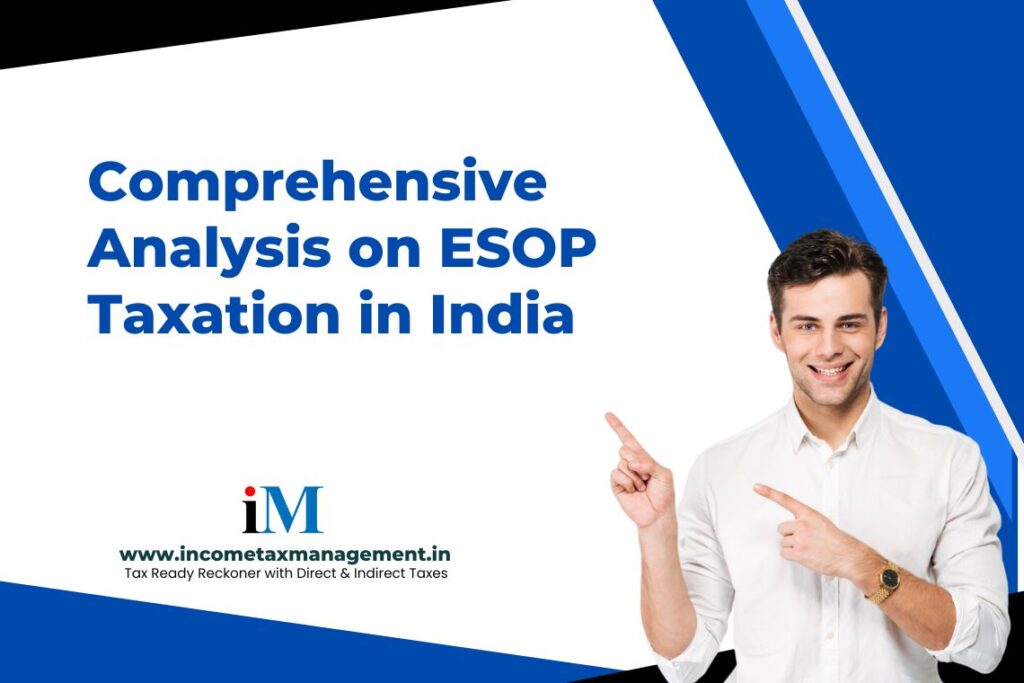Employee Stock Option Plans (ESOPs) are popular mechanisms through which companies attract, retain, and incentivize employees. However, the taxation of ESOPs can be complex, particularly in the Indian context where specific provisions under the Income Tax Act, 1961, govern their treatment.
Legal Framework: Under Indian tax law, ESOPs are considered as perquisites (additional benefits) to the employees and are taxable under the head `Salary.` The provisions governing the taxation of ESOPs are primarily encapsulated in Section 17 of the Income Tax Act. Specifically, subsection 17(2)(vi) elaborates on perquisites, including the benefits arising from ESOPs.
Section 17 and ESOPs
- Subsection 17(2)(vi): This subsection includes within perquisites the value of any specified security or sweat equity shares allotted or transferred, directly or indirectly by the employer, free of cost or at a concessional rate to the employee.
- Taxation Event: The taxation of ESOPs occurs at two stages:
- At the time of exercise: When the employee exercises the option and shares are allotted, the difference between the exercise price and the fair market value (FMV) of the shares is taxed as a perquisite.
- At the time of sale: Any gain arising from the sale of shares, over and above the FMV considered at the exercise stage, is taxed under the head `Capital Gains.`
Taxation of Unlisted ESOPs
For ESOPs pertaining to companies not listed on any recognized stock exchange in India, the determination of FMV is critical and typically requires a valuation by a registered valuer. The lack of market liquidity and public trading data can complicate this assessment.
Fair Market Value Calculation
The fair market value (FMV) of ESOPs is crucial in determining the tax liability at the time of exercise:
- Listed Companies: For shares listed on any recognized stock exchange in India, the FMV is determined based on the average of the opening and closing prices of the shares on the date of exercise. If there is no trading on that day, the last day’s trading price is considered.
- Unlisted Companies: For companies not listed on any recognized stock exchange in India, the FMV must be determined by a merchant banker or an accountant as per the prescribed guidelines. This valuation determines the perquisite value to be taxed under the head of salary.
Treatment of Foreign Listed Companies
For Indian tax purposes, shares listed on a foreign exchange not recognized in India are treated as unlisted. Therefore, their FMV is determined in the same manner as that of unlisted companies, necessitating a formal valuation.
Judicial Interpretation: Sanjay Baweja vs. DCIT
> Background of the Case
The case of Sanjay Baweja vs. Deputy Commissioner of Income Tax , decided by the Delhi High Court, highlights the complexities surrounding the taxation of ESOPs, especially when compensatory payments are involved separate from the traditional exercise of options.
> Facts of the Case
- Petitioner: Sanjay Baweja, an ex-employee of Flipkart Internet Private Limited, part of the Flipkart group.
- ESOP Grant: Under an ESOP plan by Flipkart Pvt. Ltd., Singapore, Baweja was granted stock options.
- Compensation: Following the disinvestment of a subsidiary, the value of the underlying stock options fell. As compensation, the company decided to pay the option holders, including Baweja, a one-time payment for the loss in value of their options.
> Contentions of the Petitioner
- Baweja contended that the one-time payment was not a perquisite related to employment but a capital receipt, thus not taxable under the head “Salaries.”
- He argued that the payment was compensation for the diminution in the value of options, not linked to the exercise or sale of the granted options.
> Contentions of the Revenue
- The Revenue argued that the payment constituted a perquisite under Section 17(2)(vi) of the Act, as it was indirectly linked to the employment and the ESOPs granted to him.
- It was further contended that all compensations or benefits arising from employment should be taxed under the head “Salaries.”
High Court`s Judgment
- The court noted that the compensatory payment was not made due to the exercise of the stock options or as a direct employment benefit.
- It differentiated this payment from regular perquisites, stating that the nature of the payment was a capital receipt rather than a revenue receipt.
- As such, the court concluded that the payment was not taxable as a salary perquisite.
Analysis of the Decision
- This ruling underscores the importance of the nature and purpose of payments in determining their tax treatment.
- This ruling is significant as it elucidates the tax implications of one-time voluntary payments (OTVP) associated with ESOPs. The court determined that payments not resulting from the exercise of stock options or stemming from any contractual commitments should not be categorized as perquisites under Section 17(2)(vi) of the Income Tax Act.
- The court`s decision hinged on the fact that the payment was not directly tied to the services rendered by the employee but was a compensation for external factors affecting the stock value.
- By differentiating OTVP from benefits linked to employment, the Delhi High Court emphasized that not every payment from employers falls under the taxable salary provisions. This distinction underlines the importance of assessing the nature of the payment rather than its form. It also encourages better structuring of compensation packages and more accurate tax planning for both companies and employees involved with stock options.
Conclusion The Delhi High Court’s decision in Sanjay Baweja vs. DCIT provides a nuanced perspective on the taxation of ESOPs and associated compensatory payments. This case highlights the judicial approach towards differentiating between payments that are core to the employment contract and those that are compensatory, arising from broader corporate actions. This differentiation is vital for taxpayers and corporations in understanding the tax implications of various forms of employee compensation under Income Tax law.












